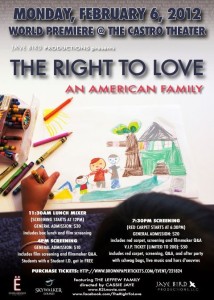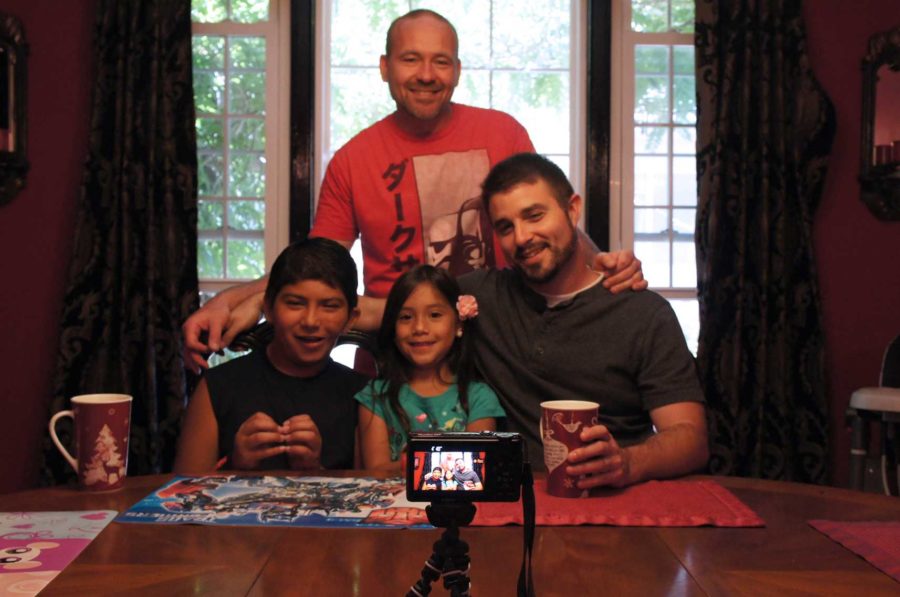The informative and emotional documentary titled “The Right To Love: An American Family” profiles a Santa Rosa couple and their two children taking action in support of gay rights, is scheduled to premiere Monday, Feb. 6 at the Castro Theatre in San Francisco.
Jay and Bryan Leffew are a typical married couple. They wake up, get their children, Daniel and Selena, ready for school just like any other family. They run errands and they help their children with their homework. Jay works as a police officer in San Francisco, while Bryan is a stay-at-home dad. Jay and Bryan are a same-sex couple.
Jay and Bryan met when they were both students attending Santa Rosa Junior College about 16 years ago. They met through a mutual friend named Jamie, who along with Jay and Bryan, were members of the Lesbian, Gay, Bisexual and Transgender (LGBT) Group at SRJC. Jay and Bryan became good friends, but it wasn’t until Jay was getting ready to move to San Francisco that Bryan decided to ask him out.
“It was really unexpected because we really didn’t have that type of friendship. I knew he was someone I cared deeply about, but I never thought about dating him. However, once we started dating, we then knew we were pretty serious,” Jay said.
About a year into the relationship, they became domestic partners, so Bryan could get Jay’s medical benefits. At this point, they both knew they wanted to spend the rest of their lives together.
Jay and Bryan put off having children for a few years and traveled extensively, but Jay knew he always wanted kids. “In high school, my girlfriend got pregnant, and I thought I was going to be a father. She had an abortion without my consent and I think fro m that moment on, I always pictured myself as a father,” Jay said.
m that moment on, I always pictured myself as a father,” Jay said.
Jay then began to deal with the fact that he was gay. “I realized it was probably something I wasn’t going to be able to do because back then I thought gay people couldn’t have kids and couldn’t get married. It’s just all the things you think aren’t possible with another man.”
Two or three years into their relationship, Jay and Bryan started talking about having kids. “We’re stable, we own a house, we are good financially. We’re not going to get anything but older! I think the time is now,” Bryan said.
Surrogacy was one option Jay and Bryan had first considered, but that thought ended quickly. When they found out that a female friend, who was considering becoming their surrogate, was having medical issues and was unable to have another child, Jay said, “We started thinking if we wanted to go through another surrogacy with someone else or do we want to actually adopt? The more we looked into it the more we realized that adoption was probably the best way to go.”
Both Jay and Bryan sought the assistance of a Sonoma County foster care agency. They discussed the possibility of adopting two children, preferably a brother and sister. They thought that by adopting two siblings it would make an easier transition for the children, since the siblings would have each other to count on. With the adoption process came several legal hurdles including financial and credit checks, complete health physicals, foster certification classes, CPR and first aid certifications, a lot of paperwork and filling out psychological profiles related to their backgrounds.
Once Jay and Bryan were deemed qualified to adopt, Jay began looking through binders with children’s photos. They gravitated towards the photo of five-year-old Daniel and 12-month-old Selena, who were biological siblings. After meeting with the two kids several times, they adopted both of them. The kids had to live with them for six months before the legal adoption could become finalized.
Besides having the desire to raise a family, the other important thing Jay and Bryan wanted was to be married. When the state of California began to recognize civil unions in June 2008, Jay and Bryan legally wed. In fact, they were among 18,000 couples the California Supreme Court allowed to remain married when Proposition 8 was upheld.
When Prop. 8, which prevents same-sex couples from marrying, was voted on in November 2008, Jay and Bryan took to making YouTube videos and posting a blog, which they titled “Gay Family Values.” According to Jay, initially the videos were made because of the frustration he felt in which no gay families or gay couples were being shown in television ads to vote No on Prop. 8. As Jay explained, “When Prop. 8 passed, we were really angry, so we went to San Francisco, and we were part of the big protest there, and we filmed that. We put that video on YouTube, and people thanked us for being a part of the protest.”
By posting their videos, Bryan concluded, “It was our way to show the world what a family with same-sex parents look like.”
Jay and Bryan did not imagined the attention they would receive by posting their YouTube videos. Young LBGT people sent positive letters and feedback thanking them for showing their family. “Many LGBT people have been told all their lives that being gay meant they would never have someone to love them or able to make a family,” Bryan said. “Through seeing our family, they discovered that being gay doesn’t close the door to any of those things.”
Some viewers have sought advice and counseling from Jay and Bryan regarding their own personal situations, something they weren’t prepared for. “I can honestly say we never expected the amount of feedback that we got on it,” Bryan said. “Sometimes it’s overwhelming. Because with all the positive stuff and request for help or advice at the same time, it’s emotionally overwhelming.”
Along with positive accolades, they’ve also had negative feedback, although it never deterred Jay and Bryan from posting videos and blogs that show viewers their children are happy and part of a normal family with a great dynamic.
The Leffews also didn’t expect to be contacted by a Marin County based film production company about being included in a future documentary they were producing titled “The Right To Love: An American Family.”
About three years ago, Jay and Bryan received an email from film producer, Christina Clack with Jayebird Productions. Clack, her sister, director Cassie Jaye, and their mother, producer Nena Jaye, are the team behind Jayebird Productions, which also produced the religious documentary, “Daddy I Do.” Christina watched some of Jay and Bryan’s YouTube videos and was inspired by what she saw.
“Christina instantly saw the love that they had, and she wanted to add them to our interview list for filming ‘The Right to Love.’ We began filming the Leffew Family in Santa Rosa, California, and we also filmed LGBT activist groups, other same-sex couples and educators, but we kept coming back to the Leffews as a special bridge between the straight community and the LGBT community,” Jaye said. “People who care about marriage cherish love and family, and the Leffews are the perfect example of respecting the sanctity of marriage.”
When Jay and Bryan first met with the producers, they were skeptical about doing the film. “We wanted to see what their intentions were. I think as soon as I sat down with the three of them, we instantly bonded,” Jay said. “We instantly thought these women really want to tell a good story, and we don’t mind being a part of it. But we wanted to see their first movie (“Daddy I Do”) before we could make that decision. Once we watched it, I think we pretty much knew we were on board with whatever they wanted to do.”
The documentary focuses on Prop. 8 and how it has affected one particular family, that used to YouTube to show their activism. “The story is about Prop. 8’s history and our family pops in and out throughout the film…pretty much talking about all kinds of different issues, like gay suicide. It’s about marriage equality, and it’s about adoption rights. It’s about all different kinds of things with the whole Prop. 8 overall as the main story,” Jay said.
The Leffews hope the documentary will educate people—gay or straight, married or single—by allowing audiences to see how they and their children live. “I think they’ll get a really good view of the future they could have,” Jay said. “If you’re a straight person, and you’re in the middle on marriage equality, or you may be against gay people marrying and you see the film, you can’t come out of the movie not questioning your beliefs. So it does a really good job of educating people on what the issues are and why they’re important to gay people.”
Before filming, Jaye said she didn’t think of this issue as being her issue, because she is straight. “After making this film, and getting to know the Leffew Family, I know now that this issue is my issue. Once you see discrimination, if you’re not helping stop it, then you are contributing to it,” Jaye said.
The world premiere of the documentary will be Monday, Feb. 6 at the legendary Castro Theatre in San Francisco. The 88-minute documentary will have two showings, one at 4 p.m. and one at 7:30 p.m. Students who come with a valid Student I.D. card will get in for free during the 4 p.m. screening. For all other people wanting to attend the 4 p.m. showing, general admission is $10 and includes the film screening and filmmaker Q&A. For the 7:30 p.m. screening, general admission is $20, which includes a walk down the red carpet—beginning at 6:30 p.m.—the film screening, filmmaker Q&A and an after party with schwag bags, live music, hors d’oeuvres and more.
You can find the trailer at: http://tinyurl.com/7dba89z or www.r2lmovie.com.



